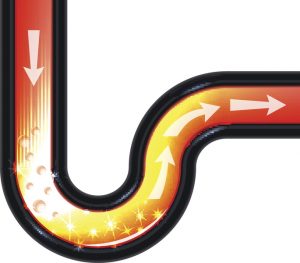 Drain cleaning is the act of, well, cleaning your drains out. You might think this is unnecessary. After all, doesn’t water and soap run down the drains all the time? Shouldn’t the frequent flow of water help clean it out? Even if the drain does clog, what else is there to do but just have it unclogged?
Drain cleaning is the act of, well, cleaning your drains out. You might think this is unnecessary. After all, doesn’t water and soap run down the drains all the time? Shouldn’t the frequent flow of water help clean it out? Even if the drain does clog, what else is there to do but just have it unclogged?
The reason people ask these questions is that they haven’t realized just how dirty drains can get, nor do they know what a dirty drain can do. In this post, we’ll go over all the details.
What Happens When Drains Get Dirty
Just to be clear, let’s go over what actually happens when drains get dirty.
Many people think of clogs as just something that happens when you put trash, a bunch of hair, or something too big down the drain. While that’s certainly true, the real reason for clogs begins with an excessive amount of substances sticking to the walls of the pipes. In particular, things like fats, oils, and greases (FOG).
Avoiding FOG in the kitchen isn’t easy, since they’re usually a byproduct of our cooking. Meanwhile, in the bathroom, many of the soaps we use to wash ourselves contain these same substances. With enough FOG down the drain, the interior of the pipe will become caked with them. At that point, they start collecting all the bits of food, hair, and trash until they form the surface of a clog. As it builds, that’s when you end up getting a problem, and that can lead to things like:
Frequent Clogs
What logically follows after a dirty drain is more clogs. Of course, just clearing out the clog isn’t going to be enough. The clog is just a byproduct of the main issue—the dirty drain.
Drains Taking Longer to Drain
Before clogs, you might just have the annoying problem of slowly draining drains. This is actually a useful indicator to pinpoint the location of the dirty drain. If multiple appliances are becoming slow to drain, then it could be a problem with the sewage line. If it’s just one appliance with issues, then you’ll know that the problem is localized to that one drain.
Bad Smells
If you have terrible smells coming from your drains, it’s most likely sewer gas rising up from the drain system. A strong possibility is that your sewer drains are backed up and need to be cleaned. It’s best to have it done as soon as possible by a Clifton, NJ plumber, too, because the gases that escape from the sewer can be harmful to your health.
Water Pressure Issues
One type of drain blockage we didn’t mention was from hard water. Hard water—water that’s rich with magnesium and calcium—can leave limescale deposits in the inner walls of your piping. This buildup can create water pressure issues and can only be cleared out with proper cleaning.
